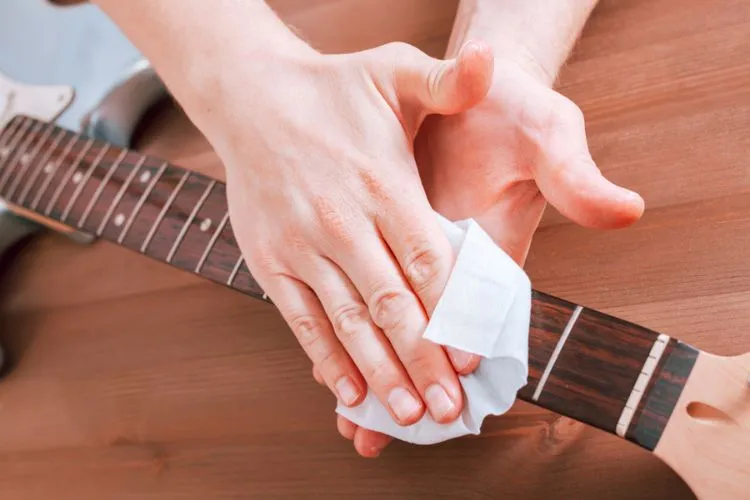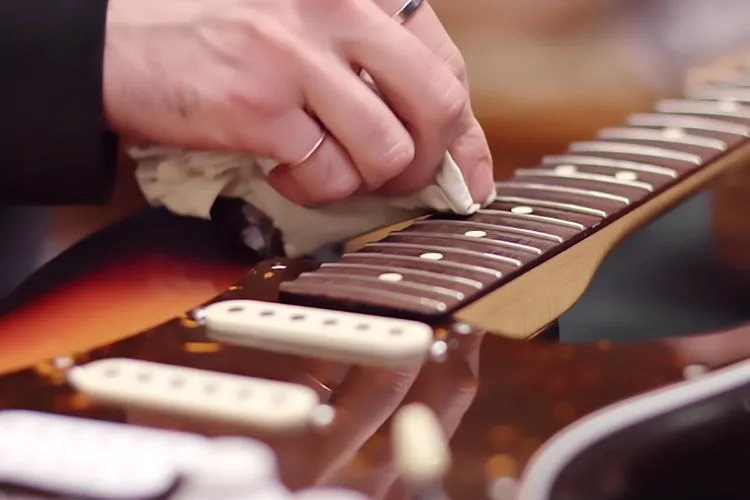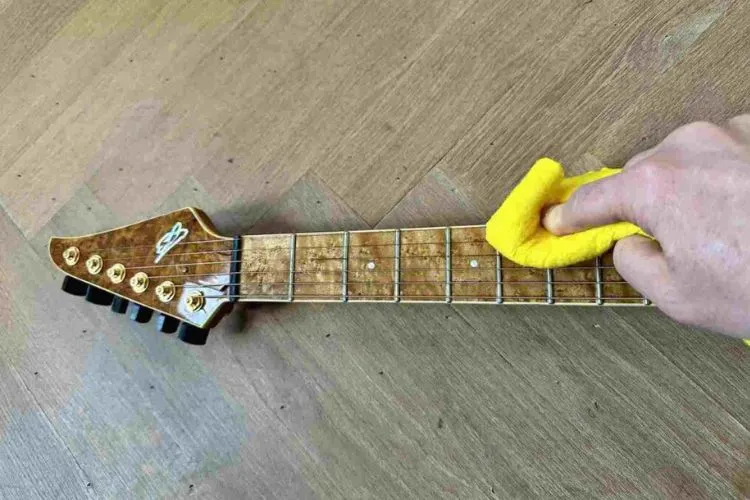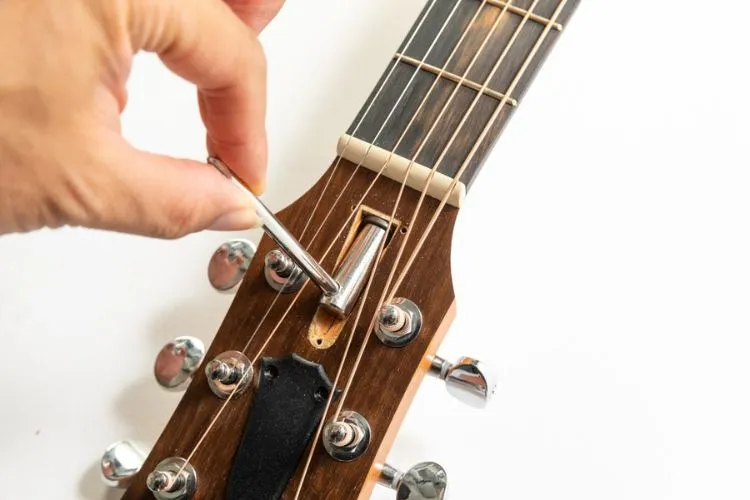The daily life of a guitar involves more than just playing beautiful music; it requires routine care and maintenance to ensure its longevity and performance.
Among the various essentials of guitar care, the fretboard demands special attention.
But, can you clean a fretboard with water?
Often, guitar players ponder whether water is suitable for cleaning the fretboard.
This comprehensive article guides you through the importance of fretboard maintenance and safely cleaning it, potentially with water, while maintaining the instrument’s integrity.

Contents
- 1 🎶Understanding the Fretboard
- 2 🎶Can You Clean a Fretboard With Water?
- 3 🎶Step-by-Step Guide to Safely Clean a Fretboard with Water
- 4 🎶Pro Tips for Fretboard Maintenance
- 5 🎶Alternatives to Water for Fretboard Cleaning
- 6 🎶Tools for Fretboard Cleaning
- 7 🎶Seasonal Fretboard Care
- 8 🎶Environmental Considerations in Fretboard Care
- 9 🎶Frequently Asked Questions (FAQs)
🎶Understanding the Fretboard
The heart of any guitar’s playability lies in its fretboard. Crafted from woods like rosewood, ebony, or maple, it significantly impacts the sound and feel of the guitar.
Overtime, contact with fingers and the atmospheric environment leads to the accumulation of oils, dirt, and grime. This not only affects the guitar aesthetically but also hampers its performance.
Why Cleaning the Fretboard is Important
A clean fretboard is essential for several reasons. It keeps the instrument looking neat, ensures smooth playability, and prolongs the lifespan of both the strings and the wood.
Dirt accumulation can corrode strings and damage the wood quality over time, making regular cleaning an indispensable practice for every guitarist.
Common Fretboard Cleaning Methods
There is a variety of cleaning methods available, tailored to the unique needs of different fretboard materials.
From specific oils to dedicated solutions, the choice depends largely on what material makes up the fretboard, as each requires distinct care.
🎶Can You Clean a Fretboard With Water?
The Potential Risks
Introducing water to wood entails several risks, including swelling, warping, or other damage due to absorption.
Moreover, water can strip away the natural oils vital for preventing dryness and cracking. Consequently, water is typically not the first choice for fretboard maintenance.
Circumstances When Water Might Be Used
In some scenarios, using water might still be considered, but with extreme caution. A lightly dampened cloth can occasionally suffice for removing surface dirt without subjecting the wood to excessive moisture.
🎶Step-by-Step Guide to Safely Clean a Fretboard with Water

Preparation
Begin by loosening and removing the strings to gain complete access to the fretboard. Have a soft, lint-free cloth and distilled water at hand to minimize potential damage from minerals found in tap water.
Cleaning Process
Dampen the cloth slightly with water and gently run it over the fretboard, avoiding excessive pressure or moisture.
Following this, immediately use a dry cloth to remove any residual moisture to prevent water absorption by the wood.
Post-Cleaning
For those fretboards made of materials like rosewood or ebony that benefit from oiling, applying a small amount of fretboard conditioner post-cleaning is advisable. This step helps replenish essential oils lost during the cleaning process.
🎶Pro Tips for Fretboard Maintenance
To mitigate the need for thorough cleanings, regular light cleanings are recommended. The frequency should align with how often the guitar is played.
Always opt for products specifically designed for use on fretboards to prevent damaging the wood. A simple but effective tip is washing hands before playing, significantly reducing the buildup of oils and dirt.
🎶Alternatives to Water for Fretboard Cleaning

For those hesitant to use water, fretboard-specific cleaners and conditioners offer a safe and effective alternative.
DIY solutions, such as lemon oil or specialized wood soaps, can also be safe when applied correctly and conservatively.
🎶Tools for Fretboard Cleaning
- Soft Cleaning Brushes: Used for loosening dirt and grime from the frets and harder-to-reach areas; gentle on wood.
- Special Fretboard Oils: Designed to clean while conditioning the wood, preventing dryness without harmful buildup.
- Microfiber Cloths: Ideal for wiping away oils and dirt; doesn’t leave lint or scratch the surface.
- Homemade Alternatives: A mixture of distilled water and a few drops of white vinegar can serve as a gentle cleaner for tougher grime, followed by a light coat of lemon oil for conditioning.
- Safe Use Tips: Always apply cleaners and oils sparingly, avoid soaking the wood, and use a separate cloth for cleaning and oiling.
🎶Seasonal Fretboard Care
Seasonal changes and varying humidity levels can significantly affect the condition of your guitar’s fretboard. During dry, cold months, a fretboard may shrink and become prone to cracking, while in humid conditions, it may swell and feel sticky.
To mitigate these effects, it’s crucial to maintain consistent humidity levels where you store your guitar. Using a guitar humidifier in the winter and a dehumidifier during damp seasons can help stabilize the wood.
Additionally, adjusting your cleaning and conditioning routines according to the season can protect your fretboard.
Regularly check the fretboard for signs of warping or cracking, and adapt your care techniques appropriately to ensure your guitar remains in optimal condition throughout the year.
🎶Environmental Considerations in Fretboard Care

Eco-friendly fretboard care emphasizes using biodegradable, non-toxic products like plant-based oils for conditioning. Opt for reusable, washable microfiber cloths over disposable wipes.
Supporting companies that source ingredients sustainably and package their products in recycled materials also contributes to responsible environmental stewardship.
🎶Frequently Asked Questions (FAQs)
Avoid soap as it may leave harmful residues on the wood. Stick to a lightly dampened cloth or designated fretboard cleaners.
Cleaning frequency should match how often the guitar is played. Generally, clean the fretboard with every string change.
Visible grime, discoloration, and a sticky feel are indicators that it’s time for a cleaning.
Prefer fretboard-specific products. Household oils can degrade and attract more dirt over time.
Immediately dry it with a soft cloth. If over-saturated, consult a professional to avoid lasting damage.
Conclusion
While the use of water for cleaning fretboards is surrounded by caution, understanding the proper methods and precautions can lead to safe and effective cleaning.
Proper fretboard maintenance is a cornerstone of guitar care, essential for longevity and optimal performance.
By choosing the right cleaning materials and methods, guitarists can ensure their instrument remains in pristine condition, ready to create beautiful music.
